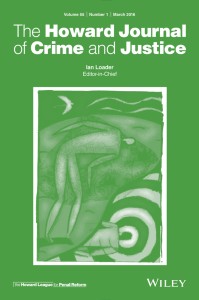The Howard Journal of Crime and Justice
An international peer-reviewed journal committed to publishing high-quality theory, research and debate.
 The Howard Journal of Crime and Justice’s editor-in-chief is Professor Ian Loader, from the University of Oxford.
The Howard Journal of Crime and Justice’s editor-in-chief is Professor Ian Loader, from the University of Oxford.
Statement of aims and scope
The journal is an international peer-reviewed journal committed to publishing high-quality theory, research and debate on all aspects of the relationship between crime and justice across the globe. It is a leading forum for conversation between academic theory and research and the cultures, policies and practices of the range of institutions concerned with harm, security and justice.
The journal is proud to be associated with, but maintains full editorial independence from, the Howard League for Penal Reform, which is the oldest penal reform charity in the world and has consultative status with both the United Nations and the Council of Europe.
The journal publishes material of a high academic standard but written, so far as possible, in a non-technical style, not unnecessarily burdened with statistical tables and specialist vocabulary. Each issue of the journal includes a book review section. In addition to published articles, the Editorial Board is open to other formats for fostering dialogue on crime and justice issues, such as special issues, themed debate sections, and interviews with academics and practitioners. The journal especially welcomes contributions from early career scholars and from authors in the Global South.
All contributions are peer-reviewed by one of the Editors and at least two members of the Editorial Board. The Board aims to have submissions reviewed in a timely manner and typically the time taken from submission to publication is less than 12 months. The journal also utilises an ‘early view’ online publication system with three months being the average time taken from receipt for production to publication on early view. Authors should note that the Editorial Board is committed to a policy of anti-racism and anti-sexism in respect of the terminology used in articles in the Journal.
The Howard Journal of Crime and Justice is published by Wiley Blackwell. Please visit the journal website for full details about how to submit papers for review.
Access for our members
Members of the Howard League can access the journal online. If you are a member, email info@howardleague.org to register and get your online access details. Hard copies of the journal are available to full rate members for free. If you are not a member, you can join online here.
-
Join the Howard League
We are the world's oldest prison charity, bringing people together to advocate for change.
Join us and make your voice heard -
Support our work
We safeguard our independence and do not accept any funding from government.
Make a donation